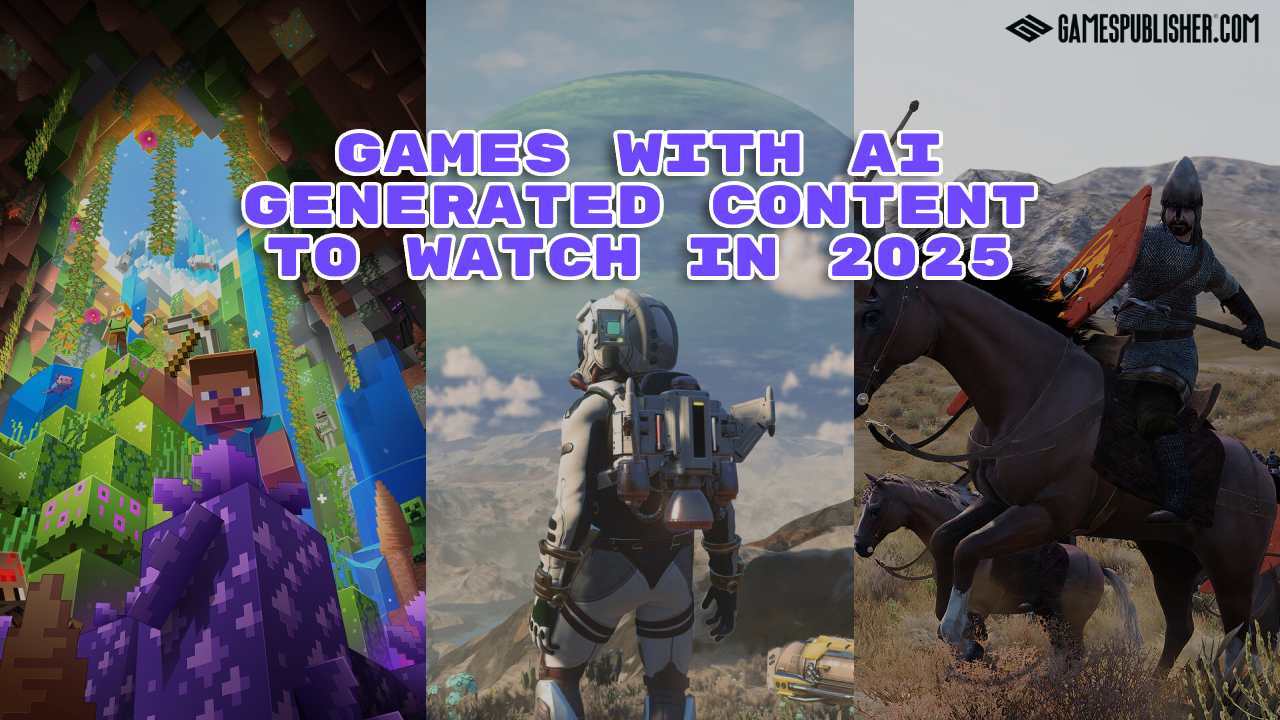The gaming world is evolving fast, and games with AI generated content are leading the charge in 2026. From crafting unique stories to building dynamic worlds, artificial intelligence in computer games is transforming how game developers create.
At Gamespublisher.com, we’re your go-to hub for tracking these game development innovations and game publishing trends.
Understanding generative AI in video games matters now more than ever since it’s the key for game developers and video game publishers to deliver scalable, personalized experiences that adapt to players.
This article dives into the standout titles using AI in gaming industry breakthroughs to redefine video game genres.
Games with AI Generated Content: A New Era of Game Development
Games with AI generated content mark a fresh chapter in game development. So, what is AI-generated content?
It’s when artificial intelligence for games crafts elements like dialogue, levels, or even characters, like AI NPC chatter or sprawling landscapes, based on smart algorithms, not just random patterns.
This differs from procedural generation, which uses rules to shuffle pre-made pieces, like dungeon layouts in roguelikes.
In contrast, generative AI in games learns and invents, producing fresh story arcs or environments on the fly. For example, an AI game generator might write unique quests, while procedural tools repeat set templates.
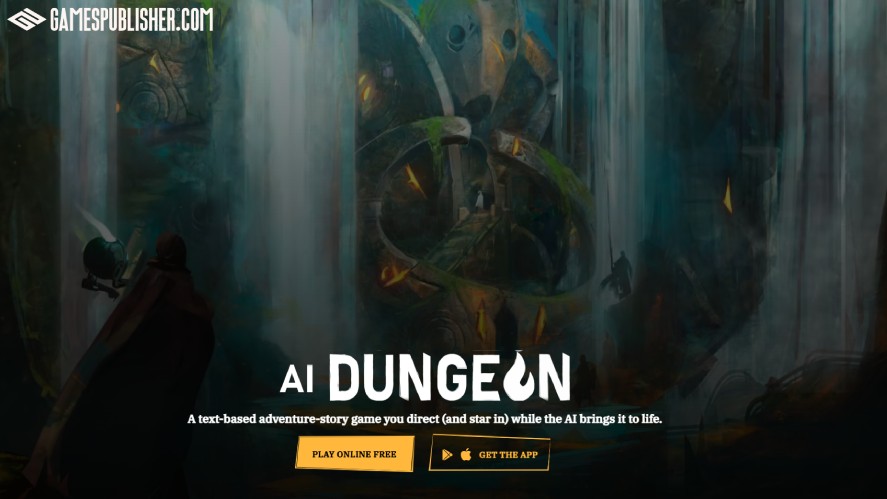
Why does this shift matter?
For indie game developers, generative AI in game development cuts time and cost, letting small teams punch above their weight in game genres like RPGs with AI RPG depth.
Meanwhile, AAA studios under video game publishers use it to scale massive worlds or tailor video game AI characters to each player.
Either way, how is AI used in video games is pushing creativity and replayability, making 2026 a thrilling year for games with good AI.
Games with AI Generated Content: Popular Titles Using AI Today
Games with AI generated content are already reshaping gaming, and several standout titles show how artificial intelligence in computer games boosts replayability and player experience.
Here are some key examples thriving in 2026.
Minecraft
Minecraft uses generative AI in game development to craft infinite procedural worlds. Its landscapes, caves, and biomes shift with each play, keeping video game genres like survival fresh.
Paired with mods like Oasis, which dreams up frames in real-time, it proves AI in gaming industry can endlessly surprise.
AI Dungeon
AI Dungeon leverages AI game generator tech via GPT models for text-based adventures.
Players shape stories, from fantasy quests to sci-fi epics, with generative AI in video games responding dynamically. This AI RPG style ensures no two runs repeat, hooking players with limitless game genres.
No Man’s Sky
No Man’s Sky takes games with AI characters to cosmic heights. Its AI builds entire planets, ecosystems, and creatures, evolving with updates into 2026.
This makes exploration vast and unique, a benchmark for game developers.
Mount & Blade II: Bannerlord
Mount & Blade II: Bannerlord, enhanced by mods like Inworld AI, upgrades AI NPC game interactions. Intelligent NPCs chat naturally, adapting to player choices with artificial intelligence for games.
This deepens role-playing, making every battle or talk in its medieval game publishing sandbox memorable.
Games with AI Generated Content: How It Impacts Game Design and Narrative
Generative AI in games is revolutionizing game development by enabling dynamic storytelling and non-linear gameplay. This shift transforms how game developers craft video game genres.
Take AI NPC design, tools like Inworld let video game AI characters react smarter, not just follow scripts. In an AI RPG, an NPC might recall past chats or shift alliances based on your actions, as seen in Bannerlord mods.
Similarly, create AI for video game NPC tech can evolve environments, like No Man’s Sky’s planets adapting to player impact, making worlds feel alive.
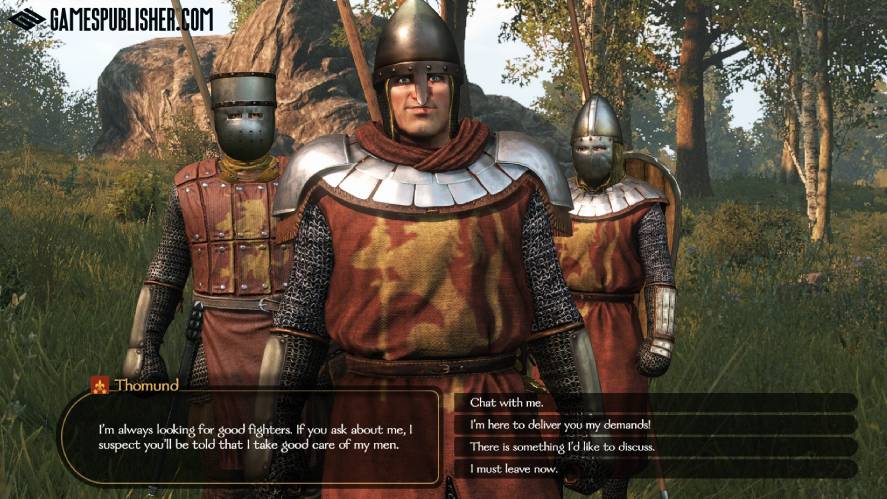
The benefits of AI generated content shine bright. Personalization tailors gaming to your style, boosting immersion in game genres like open-world or narrative-driven titles.
Longer engagement follows, as games with AI generated content offer fresh twists each time. For video game publishers, this means deeper player investment.
However, there are some risks. Unpredictability from artificial intelligence in computer games can stray from intended plots, challenging game developer control.
Quality assurance gets trickier. How do you test infinite outcomes? Still, the trade-off for generative AI in video games is a richer, wilder game publishing frontier in 2026.
Games with AI Generated Content: Tools and Platforms Developers Use
Behind games with AI generated content, powerful tools and platforms fuel game development innovation in 2026.
These generative AI in games solutions help game developers craft dynamic experiences across video game genres.
Procedural Generation Engines and APIs
Procedural generation gets a boost from AI-driven engines and APIs.
Unity’s ML-Agents trains AI NPC behaviors using machine learning, letting game developers create characters that adapt to players in games made in Unity engine.
For example, NPCs can learn to dodge or strategize, enhancing games with good AI.
Meanwhile, GPT-based storytelling tools, like those powering AI Dungeon, generate unscripted narratives for AI RPG titles, like quests that evolve with your choices.
Over in games in Unreal Engine 5, AI in Unreal Engine shines with MetaHuman AI, animating video game AI characters with lifelike reactions.
These tools make artificial intelligence in computer games a cornerstone of replayable gaming.
Integrating AI Art and Music into Games
AI also transforms visuals and soundscapes in game development.
For environment art, Midjourney and Stable Diffusion churn out stunning landscapes or assets fast. Generative AI in video games cuts design time, letting indies craft unique game genres without big teams.
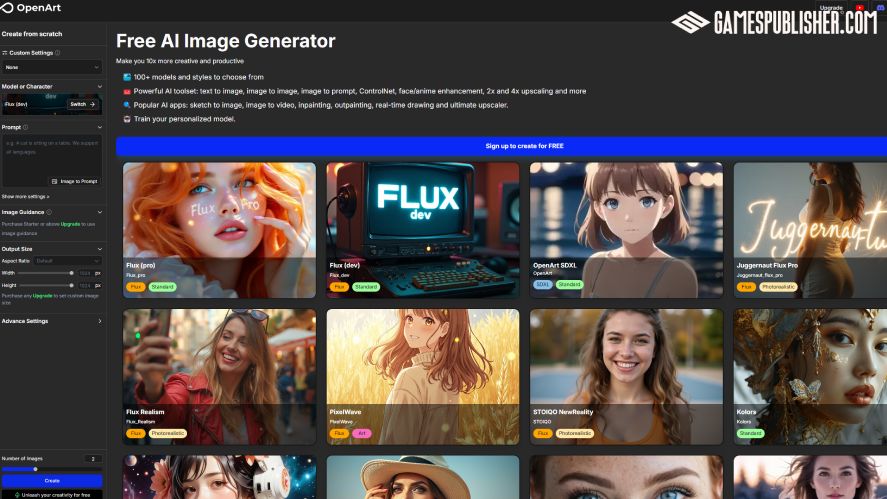
On the audio front, Aiva and Amper Music compose AI-generated music and ambiance. Aiva scores epic AI RPG tracks, while Amper tailors loops for casual gaming vibes.
Together, these AI in gaming industry tools deepen immersion, proving how AI can elevate every layer of games with AI generated content.
Games with AI Generated Content: Opportunities for Game Publishers
Games with AI generated content open exciting doors for video game publishers in 2026. These artificial intelligence in computer games advancements bring practical and creative wins.
First, they cut game development time and costs.
Tools like generative AI in game development let game developers churn out assets fast, cutting budgets for video game genres like RPGs. This efficiency boosts game publishing margins.
Next, live-service games thrive with infinite content. AI game generators craft endless quests or maps, keeping players hooked without constant manual updates.
Finally, the marketing potential shines. For example, games with good AI tout “intelligent, evolving worlds”, a buzzword that grabs attention in gaming circles.
For Game Publishers, AI in gaming industry is a goldmine for scalable, sellable experiences.
Games with AI Generated Content: Ethical and Creative Concerns
While generative AI in video games dazzles, it stirs ethical and creative debates for game developers. These issues shape 2026’s game development landscape.
Originality and ownership spark concern. If an AI game maker like Stable Diffusion spits out a level, who owns it? The dev or the algorithm?
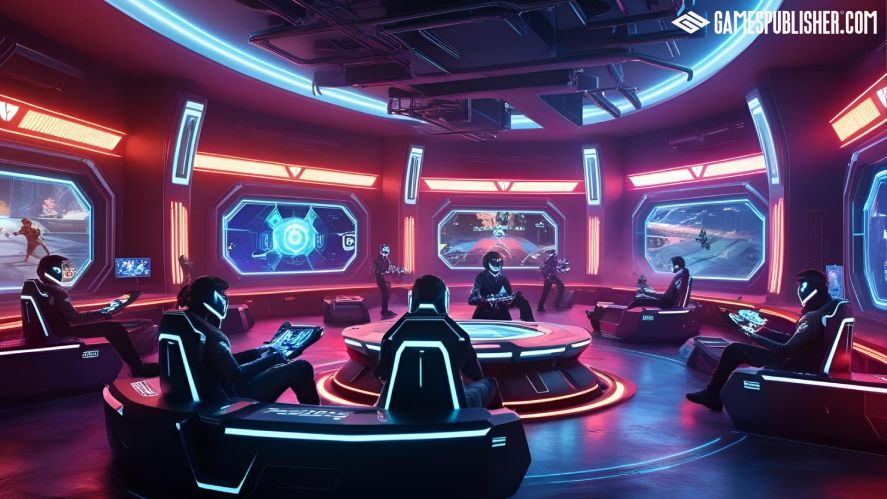
AI hallucinations can muddy video game AI characters or stories, risking quality in game genres.
Does artificial intelligence for games lack the soul of human craft? Critics argue AI NPC dialogue or AI RPG plots feel mechanical compared to hand-written tales, potentially dulling games with AI characters.
Looking ahead, legal headaches brew. Using generative AI in games for commercial game publishing might face copyright or liability fights.
For video game publishers, balancing games with AI generated content with human touch is the 2026 challenge.
Games with AI Generated Content: What’s Next?
The future of games with AI generated content promises bold leaps in game development beyond 2026. Here’s what game developers and video game publishers can expect.
Imagine fully AI-directed AI RPGs. These titles could craft entire campaigns, from plots, characters, and twists, using generative AI in game development, adapting to player choices without pre-set paths.
Next, MMOs might feature real-time AI NPC evolution. Powered by artificial intelligence for games, NPCs could learn from interactions, forming alliances or rivalries across video game genres.
Similarly, dynamic quests could shift based on player psychology. AI in gaming industry analyzing playstyles to tweak challenges, like tougher foes for bold explorers.
To prepare, game developers should master AI game generators, while game publishers invest in scalable game publishing pipelines for games with good AI.
Conclusion
Games with AI generated content are revolutionizing gaming in 2026, blending generative AI in video games into creation like never before. Looking ahead, AI NPC game dynamics and adaptive narratives signal a wild future for how is AI used in video games.
At Gamespublisher.com, we urge game developers and video game publishers to dive into AI game makers and experiment while tackling risks like originality or control. The AI in gaming industry wave is here, so ride it smartly.
Loading survey...

